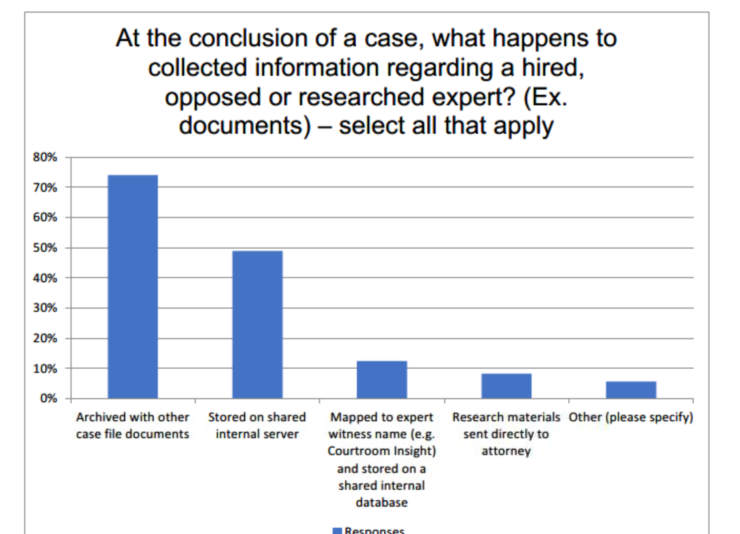
Today Courtroom Insight, Daubert Tracker and Expert Witness Profiler are releasing the results of a new survey which was “developed to better understand commonly used expert witness research and retention techniques among litigation professionals.” Every law firm with a litigation practice is aware of the pain points associated with identifying, researching and validating experts.
The nationwide survey was conducted by email in late 2017 and early 2018. Thousands of litigation professionals, including attorneys, law librarians and paralegals, were invited to complete the survey, with 580 actual respondents. Although advanced technology solutions have been developed for legal research, ediscovery and case management; expert witness research is still a feral and largely untamed workflow. There is no shortage of vendors hawking a “magic bullet” solution – but the survey below indicates that the market is still waiting for a comprehensive workflow and research solution… extending to internal expert knowledge systems within law firms.
Issues examined in the of the survey include:
- Approaches used to locate an expert with specific expertise
- Usage of expert witness referral firms
- Impressions of expert witness directories
- Evaluation criteria and encountered difficulties when performing expert research
Preferred sources of expert witness information:

Things that caught my eye:
- Google is the primary method that people use to identify experts ouch
- Half of the respondents have never used an expert witness referral firm
- Top expert witness referral firms are Tasa and Round Table Group Thomson Reuters West
- Expert witness referral firms are generally regarded as a last resort effort
- DRI and Westlaw are the most common systems used for expert witness research. Each used by about 60% of the respondents.
- State or local bar associations are the most common source of expert witness listings
- 70% of respondents file the expert witness materials away with case files and don’t add to a firm wide expert witness repository.
There Is No Plug and Play Expert Witness Solution! The chart below illustrates the challenge of expert witness research. Almost every category of research is almost always needed to identify and vet an expert. Information that is of high importance in identifying an expert t include licenses, credentials, resumes, degrees, history of Daubert challenges, recommendations reviews and testimonials, testimonial transcripts, published expert witness reports, lists of authored publications, prior firm retention verdicts and settlements in prior cases. That litany sums up the problem. There are simply too many types of disparate information that reside in to many different sources both internal and external to make expert research easy even in the most sophisticated law firms with the most sophisticated suite of products.

Expert Witness Credibility Surprise One of the most stunning statements appears on page 12 of the report. Almost 60% of respondents have been surprised by at least one aspect of an expert background or expertise. This bad news surprises include finding out that the expert has a criminal history, has been sued , has been accused of malpractice, has plagiarized and has falsified their resume!
On page 13 there is a litany of ways that insufficient information and vetting can be used to undermine the credibility of experts. Examples include: experts losing their credentials prior to testimony, expert published articles including statements contrary to their testimony, and other witness stand nightmares.
Only 10% of respondents report being involved in cases where insufficient knowledge about the expert had an adverse impact. But my suspicion is that since both parties are “flying blind” and neither side is able to leverage damaging information regarding their opponent’s witness to their advantage.
The Expert Witness Knowledge Management Challenge
A whopping 70% of respondents simply file the expert witness information in with the case file and do not map it to an internal expert witness resource. This is a knowledge management catastrophe

Courtroom Insight which sponsored the research is one of the many start-ups trying help law firms create custom research solutions which offers to help them close the internal knowledge retention and sharing gap indicated in the above chart. Anyone trying to tackle expert witness workflow and knowledge sharing in their law firm should invest 10 minutes in reviewing this report. Even if the report only confirms what you have already observed, it also provides lots of ammunition for opening a discussion on improving expert witness research workflow at your firm.
Here is a link to the press release and report.